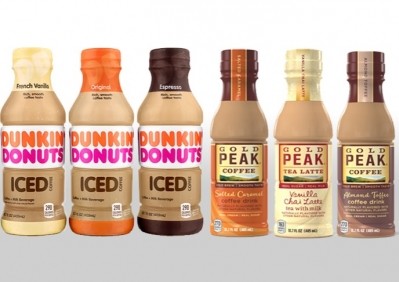Research suggests coffee could improve health, but it's too soon for marketing claims

An umbrella review of 218 studies examining more than 60 unique health outcomes published in The BMJ this month revealed that “coffee consumption was more often associated with benefit than harm” with the “largest relative risk reduction [of various diseases] at intakes of three to four cups a day versus none.”
Specifically, a team of researchers led by Robin Poole, specialist registrar in public health at the University of Southampton, found high coffee consumption compared with low was consistently associated with a lower risk of death from all causes, including a 19% reduction in cardiovascular mortality, 15% reduction in death from cardiovascular disease, an 18% lower risk of developing several cancers including prostate, endometrial, skin and liver, as well as a reduced risk of developing type 2 diabetes, gallstones and gout.
Drinking coffee also was correlated with reduced risk of cognitive disorders, including a 27% lower risk of developing Alzheimer’s disease.
A few notable risks
Not everything the researchers turned up for coffee was positive. Rather, the findings suggest women who are pregnant or prone to fractures should limit their intake or risk negative health outcomes.
For example, the study found high coffee consumption was associated with a 31% increased risk of low birth weight, 22% increase in preterm birth in the first trimester and 46% increased risk of preterm birth in the second trimester.
Because the studies were mostly observational the researchers did not pinpoint a cause of the negative outcomes, but they hypothesize it could be related to the half life of caffeine being double during pregnancy meaning the relative dose of caffeine is much higher for pregnant women from a standard cup of coffee.
The report adds: “Caffeine is also known to easily cross the placenta and activity of the caffeine metabolizing enzyme, CYP1A2 is low in the fetus, resulting in prolonged fetal exposure to caffeine.”
On a positive note, the researchers did not find a connection between coffee exposure and neural tube defects.
Turning to fractures, the study found a 14% increased risk of fracture for high versus low consumption in women and a 0.6% increased risk for one extra cup a day in women.
An exact determination of cause was not possible due to the observational nature of the research, but the study suggests caffeine could be the root of the problem.
“Caffeine has been proposed as the component of coffee linked to the increased risk in women, with potential influence on calcium absorption and bone mineral density,” it reports, adding, “Coffee and caffeine have also been linked to oestrogen metabolism in premenopausal women and increased concentrations of sex hormone binding globulin” which are associated with risk of fracture.
Hold off on health claims
Despite these negatives, the researchers argue that the overwhelmingly positive findings and high safety profile of the beverage make a case for conducting future randomized controlled trails without fear that increasing coffee consumption would harm participants.
In a corresponding editorial that The BMJ also published, Eliseo Guallar at the Johns Hopkins Bloomberg School of Public Health agrees that the need for additional research on any potential benefits – or harms – of coffee is necessary before recommendations about consumption can be made.
But Guallar also argues such research is a big undertaking.
“Does coffee prevent chronic disease and reduce mortality? We simply do not know. Coffee drinking is a complex behavior determined by cultural norms and associated with multiple socioeconomic, lifestyle, dietary and health behaviors,” Guallar writes.
As such, Gualler argues future research would need to be long-term, include a large sample size, look at genetics, consider caffeine levels and consider behaviors commonly associated with drinking coffee – such as smoking or consuming products with refined sugars and unhealthy fats.
Given so many unknowns, Guallar argues, doctors should not recommend drinking coffee to prevent disease and people should not start drinking it for health reasons.









